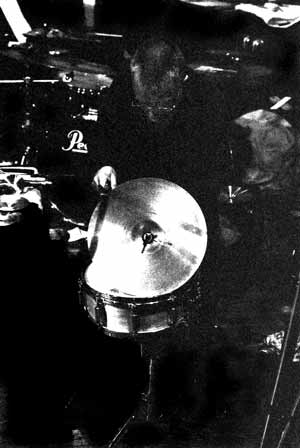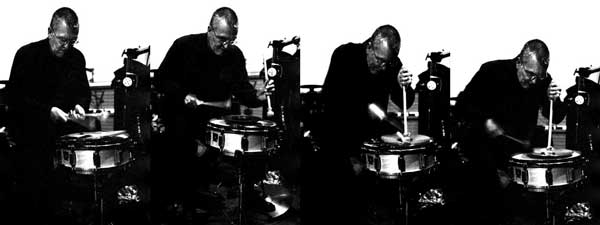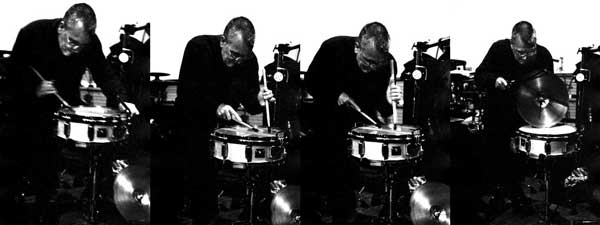Eddie Prévost:
Master Of Disorientation
As a founding member of the British improvising collective AMM (with composer/improviser Cornelius Cardew, Guitar vivisectionist Keith Rowe and others) Eddie Prévost helped define a new improvising ethos closer to contemporary European "art" forms than to anything ever "filed under jazz" before or after. AMM was also the rare band to actually perform the political resonances of freedom in music, without ever descending into the catacombs of illustrative populism. Though their music generally remained Britain's best-kept secret, their influence on a generation or two of improvising, rock, pop and noise musicians is incalculable.
Eddie Prévost has also bravely endeavored to capture the AMM aesthetic (and much more) in the language of words. Lectures, articles and workshops are just other ways of making music happen. His book of essays No Sound Is Innocent must be the closest anyone has ever come to pinning down in words what Prévost refers to as "meta-music".
But master drummer Eddie Prévost hasn't renounced the bourgeois pleasures of swing either. Duets recorded in the nineties with Marilyn Crispell and Evan Parker (and mercifully released on his own Matchless label) should instantly dispel any noises about free music being either "cerebral" or "confused".
Eddie Prévost also leads his own ensembles and participates in a variety of collective efforts (Supersession, Resoundings, the Free Jazz Quartet, Masters of Disorientation, God, London Musicians' Collective).
The interview was conducted by e-mail in March 2001.
Dear Eddie, as you can see it's an awful lot of questions. Once we got started we just couldn't stop...
Like most people we were brought up to believe music is only music when someone decides beforehand what everybody is going to do. We're not professional musicians. We've attempted free music just often enough to have an inkling of how formidable the obstacles are between "jamming" and spontaneously composing something that... here already the difficulties arise. So what we really want to ask you are a few elementary questions, naive questions perhaps, about this art of musical improvisation.
We've been hearing these persistent rumors. Good music is difficult. Demanding for the listener. Not suitable for casual listening. Simply enjoying it requires almost as much inquiry and discipline as playing it. Of course we've got the music industry to blame for all that, and the lazy audiences... But don't we also cherish this perception? If some unassuming soul stumbles upon our little hideaway, what do we greet him with? "Beware! Difficult! This is going to be a rough ride!" - or is it all just a perverse kind of sales pitch, a secret code, for the insiders?
Anybody who ventures into this "difficult musical world" you describe probably is already disenchanted with being treated as a mere consumer of music. And, perhaps (if only intuitively) recognises that there are signals within all cultural manifestations. These signals indicate and sometimes consolidate cultural and social affiliations - as for example, with particular kinds of national folk musics. Other musics represent alternatives to the orthodox. For example, punk rock or rap. In other words, musics (as also of course with other artistic and cultural manifestations) give us choices for life. And, of course these often become multiple choices. One choice need not necessarily rule out other choices.
If the practitioners, of the kind of "difficult music" you describe, work to make listeners have a hard time, then they ought to question their motives for making their music. Maybe exclusion and alienation is part of these musicians' agenda! However, musicians ought not to tailor their music to suit the naive sensibilities of a new listener. There should be a certain amount of understanding and pliability on both sides. At the same time I see no point in trying to "persuade" anyone that they should find something worthwhile in a music. This is always an individual journey. Each must make up their own mind. Although there is always a social dimension in the making and in the perception of any art form.
If you listen to the reviews and the liner-notes, you should put on the record and sit there just listening to it for forty-five or seventy-five minutes, maybe have a few thoughts or feelings about it and that's all. Reading (or writing) a book or socializing at the same time is already suspicious, cleaning up the house is almost heresy, and going to sleep, well - really, have you understood just what this music is all about? While in fact good creative music is simply the best background muzak. A concert is different - you're right in the middle of it, here and now, you know you can never put it on again. You see the musicians breathe and you wonder what kind of sound it's going to produce this time. But we very rarely get that level of involvement with a record.
Obviously, there is a qualitative difference between a concert experience and a recording. And in general I think the recording is a dangerous medium for the musics you describe. It disassociates and desocialises the experience. Maybe it also de-sensitises the listener. On the positive side, it introduces people to musics that they may not ever be able to hear live. And, the recording itself acts as an indication of what such a live experience might be like. It also signals that such musics actually exist! Of course, there are distortions in this simple scenario. Many people have perhaps become addicted to the recorded experience and do not even seek the live. This is a pity. A recording, by definition, is a repetition. In improvised musics the most powerful component in a successful performance is its transience and the sense of "never having been in this place before". Awareness is sharpened. A recording on the other hand ossifies the sounds and the occasion. The music which has become the recording may have been full of surprises and tensions in the making. But what was full of doubts and unique realisations in the performance becomes certain and "classicised". The previously dangerous explorations become like walks along tame foot paths through gentle and familiar countryside. Only the very best recorded examples can sometimes transcend this experience. And then one suspects that it may wear off!
Free musicians don't like to explain their music, and wave aside as irrelevant any attempt at formal analysis. Skeptics see this as more "evidence" that free music is really just a load of crap. "Gesture without meaning, like a performance of Shakespeare in gibberish sounds", is how Yehudi Menuhin sniffed at Schönberg's music. Eventually one has read and heard all the arguments from both sides. Then all that's left is the music itself. What it does to you. The sound, the feeling, the experience. Does it matter at all whether or not music is valid, according to any analytical model? Or even on its own terms - the standards of the musician himself?
Trying to explain music to ourselves will confound us all. Obviously, the sound is paramount. A music is always judged by the impact of its sound and not whether it has a coherent inner logic. However, listening to music is itself a perceptive and an analytic exercise. We are analysing the music when we listen to it and judge its value. This question probably revolves around the idea of making music fit some theoretical model.
My answer to this is that a musician and the audience for music has a mind. They also use intellectual criteria to judge the value of the work. To pretend otherwise is naive, intellectually lazy or dishonest. The problem with not analysing an experience is that the listener may well be making unconscious categorical mistakes. (The following sentence may seem to make no sense. But it might ) "The listener may not be listening to what they think they are listening to". What can happen is that listeners make an aesthetic mis-match. They have certain expectations of the experience which are not necessarily realised.

The best example of this paradox is in fact the very one that most animates free music propagandists when they confront a "nonbeliever". Let me explain. A new listener to freely improvised music comes to this experience not as a fresh mind. Every listener has a wealth of listening experience. They may have been taught western classical. They may be embued with the folk music of their ethnic culture. They may have been thoroughly lost in the hedonism of rock and roll. When such a person comes to another form of music, whose rules of performance (and of listening) are different from what they have experienced so far, they are confused. The sounds, the anticipated meanings and the expected effects, do not occur. They suffer what I call an aesthetic mis-match. Small wonder then without gaining some understanding about the rules of engagement and the musical objectives, that a new listener is completely bewildered by what they hear. If this is the case, then it follows that there must be some kind of specific analytical framework for free improvisation, as there is for every other kind of music. To deny this fact is in a way to deny entry for others into this world, and it also hampers the music's development.
In a group improvisation you can never hear yourself the way you sound to the other players. From where you're standing you're always right in the middle of it. The audience and the recording devices also pick up an entirely different combination of sounds. In free group improvisation, playing the right thing too loud or too soft can make it sound quite wrong. And what if you can't even hear the people at the other end of the stage? Is this all just a matter of stage technique, a technical problem for which there is a technical solution, or is it something inevitable you have to learn to deal with in a more philosophical way? How can you ever know what your place is in the whole?
If the criteria for making improvised music is that you must be able to hear all the constituent parts and respond to them, then, from a practical point of view, large group improvisation is difficult if not impossible to practice. Of course it may be perfectly possible to make a good piece of music - as far as an audience is concerned - without the players being able to hear each other. But personally I find this an unsatisfactory situation. It becomes then a strategy for performance which might as well be a composition. (note: symphonic orchestral players cannot hear all the parts of the music that they are engaged with).
You can never be certain of your place within the whole. But, in my opinion, part of the reason to practice this music is to try and discover something more about yourself. This is in relation to the materials you use and in relation to the musicians you perform with. I think that there should be something transcendent in the experience. If working within a large ensemble negates this kind of possibility, then the player should stop and work within small groups.
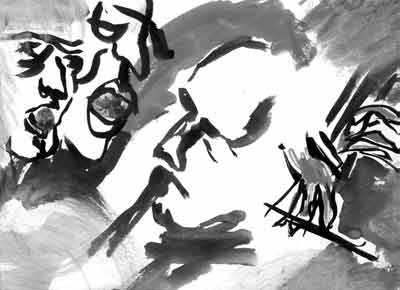
Improvising musicians seem immune to stage fright. Is it because the audiences are small and familiar, attuned to your own musical language and to what you're attempting to set up? Or have you just not understood the deepest essence of improvisation if you have to throw up before a performance?
I am not sure that it is true that improvisers are immune from stage fright. But it is certainly so that the more experienced you are the more familiar and therefore the more confident you might be working in front of an audience. Playing any kind of music in public is a very exposed situation. (Performing in front of small audiences is in some way very much more difficult. A large mass audience in front of you has no particular personality. You cannot even distinguish specific faces). Playing improvised music is much more exposed. And there is no composer to blame for the resultant music!
True improvisers are not expected to pay much attention to their appearance. Within legal boundaries seems good enough, especially here in northern Europe. You should look like your next door neighbor when you meet him late at night on the stairs taking out the trash. One British avant-garde band that does like to put on something nice for a gig, the Remote Viewers, reports meeting a lot of raised eyebrows. Is there something like an unspoken dress code at work here?
I have no particular view on this question. Dress could be part of a performance strategy. Personally I am not interested in projecting any particular image. In a sense I would not mind being invisible. The music should speak the loudest. There might be a problem if the dress distracts listeners from the music. If this is the case then perhaps the performers in question are doing something other than simply improvising.
Improvising musicians fiercely detest being herded up as a "genre" or "style". On the other hand they end up playing with each other a lot. Also, the audiences that go to see the other improvisers, acquire and bring along expectations of how a concert of improvised music should sound. Some musicians thrive in all this cosy promiscuity, jump in bed with anyone who's game to jump in with them. Others specifically avoid anything that might lead to incest and inbreeding. There's no actual question here, we'd just like to hear your thoughts on the subject.
I can think of no particular objection to the idea of musicians forming many musical partnerships. My only observation is that sometimes it is necessary to let a musical relationship mature. Very often the first meetings of musical minds tend to be exciting because of the freshness, the newness of the musical collaboration and its output. After a while, if a musician is more inclined towards short term musical relationships then I think there is perhaps - especially in an unformed or newly formed musical personality - little evidence of musical development. Some kind of a challenge is useful in musical life. If you move away from a musical format as soon as the questions start getting a bit difficult to answer, then there is no likelihood of development, only perhaps stasis and repetition.
Group improvisation doesn't work on a stage full of grandstanding egos. The dictatorship of the musical process itself seems to be the only way. AMM especially made a point of taking this requirement very literally, to the point where it became irrelevant who was playing what. (At least for the listener. See also the next question.) The counterpoint between AMM as a band and AMM as a political think tank is well documented. Still humans will be humans, and egos can take on surprisingly subtle forms. How, then and now, do you handle this? Is this a matter that is openly discussed or is it more a process of natural selection - those who can't listen and aren't strong enough to lead their own show just disappear because no one wants to play with them?
There is a difference between what you call "grandstanding egos" and strong personalities. One suspects that "grandstanding egos" are in fact a manifestation of weak or insecure personalities. All musicians need to feel that their contributions are of worth. And, as you say, "humans will be humans". Even in the current experience of AMM there are moments of disagreements and doubt. That is part of life. But ultimately, if you perform within some kind of collective ethos, you must value the context and be cherished by it. If, for example, a musician begins to feel unwanted or feels that others are not making a reasonable contribution, that there is some kind of a battle going on for dominance of whatever kind, then obviously the collective has broken down. It needs to be repaired or else broken up completely.
In Derek Bailey's book, "Improvisation - Its Nature and Practice in Music", you're quoted as saying: "When the musical situation seems chaotic, when we are caught up in the maelstrom of sound, in which at times it is almost impossible to tell who or what is going on, that is the point when you have to 'distinguish' yourself, delineate your contribution, or else the enterprise is a meaningless cacophony." That struck us as paradoxical - the situation you describe sounds like some of the most uplifting moments of music-making, when things happen we didn't think we were capable of. Or is that only relevant for the novice improviser?
I have to say that the answer you quote from me seems most unfamiliar. I will stand by its meaning - even though the argument needs to be unpacked. There is indeed a joyful experience of immersion within a maelstrom of sound, when the self is perhaps all but indistinguishable from others. I think however that this is a rare experience. Mostly the musician is negotiating with the sound sources and the other musicians in the ensemble to make something meaningful in the time they have together for performance. Generally, in my experience this is not a location of riotous semi-conscious excitation. Although some exponents of "free jazz" clearly use a fiery declamatory technique to try and push themselves beyond conscious formulation. There are other ways of doing things. And the fact that, in my opinion, free jazz is now a rather tired medium perhaps points to the redundancy or inadequacy of this technique. I would rather take the creative situation to another place. A more thoughtful, a more reflective engagement. This does not, I can assure you, preclude the possibility of the kind of discoveries to which you refer. In fact I rather suspect that such new discoveries only come through a fresh review of the musical context. Sublimation does not seem to allow for this.
The first time we heard you - the only time we heard AMM live - we had no idea of who you were nor what you represented. We came in ten minutes late and spent the rest of the concert standing or squatting uncomfortably. We won't even try to describe the impact of the music, beyond the fact that we were moved and shaken in a very subtle but very unmistakable way. Every note seemed as pivotal as the first cry or the last breath. Everyone present, including the less impressionable connoisseurs who had heard it all before, agreed it had been a remarkable concert. With a music so devoid of objective signposts, how could everyone in the room know for a fact, feel without a doubt, the quality of what they had just witnessed?
I do not know the answer to your question. But I think that I can refer you in part to my last answer. If we (i.e. AMM) are not thoroughly engaged with the enterprise, if we are not attentive to the situation (which has many facets), then there is perhaps not much likelihood that the audience will feel so absorbed. There are, of course, moments of loudness and harshness in our music, but it is a controlled investigation. I express a paradox but during a performance we are both certain and uncertain of what is unfolding. It is rather like (I imagine) walking a tightrope. The successful execution of an act depends upon the musician being acutely aware. We fail, of course, but somehow we seem - even in failure - to be able to restore some kind of equilibrium and resolution. I suspect that if we tried to understand this process too closely we might lose the very facility we are examining.
After the concert, which was taped, we asked you if you might consider releasing it as a record. Eventually you must have listened to the tape, debated its strengths and weaknesses with the other players, and decided not to release it. Is a successful improvisation also a worthwhile recording? Does a worthwhile recording make a good record? Why aren't there a hundred and fifty AMM records?
I think that we may have burdened the world with enough CDs. A hundred and fifty might be somewhat excessive, when there is (arguably) already too many CDs in the world. But to the serious content of your question: a good improvisation may not translate into a good recording for all kinds of reasons. The quality of the recording for example may not match the perception of the performance. Small deficiencies in a performance may become somewhat irksome with repeated listenings. Sometimes there are features within an improvisation that simply do not translate to the recorded medium. Cornelius Cardew once remarked that a recording does not let you experience the view from the window! A performance is always a special occasion. Our feeling is, that impossible though it might be, listening to a CD should also be special in some lasting way. Not all recordings reach this criteria. And there is only so much validity in the argument for documentation.
Another apparent paradox. Is technical mastery a prerequisite for freedom, for improvisation? How come the people with the most interesting things to say are also the ones with the most refined means of saying them? Could improvised music ever be reduced to mechanical, instrumental dexterity, without any passion or vision? And on the other end of the spectrum, how come there isn't any punk improv, a music of pure gesture and attitude?
There are a lot of questions in this package. Manipulative dexterity is sometimes confused with musical technique. Musical technique, i.e. the ability to make meaningful music can be achieved with a minimal amount of manual dexterity. Conversely, it is also possible to make good music and have manipulative dexterity. As always it is a question of what you do with the resources at your disposal. The refinement you speak about may in itself be "the technique". I think that you already have the answer to your question about Punk. It is as you say pure gesture and attitude. It is what Marx would describe as "the negation of a negation". That is, it merely complains about the situation but offers no solution.
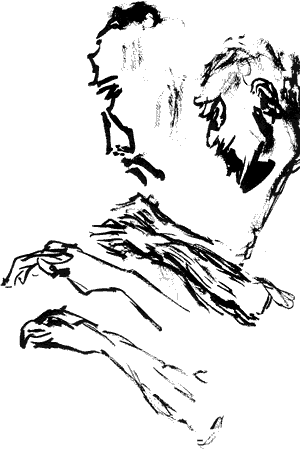
You've been on the road all day. Right on time, you get to haul your stuff inside. No, you're not the plumber. The stage is still a full ashtray overflowing with beer bottles and stale glasses. You have to wait an hour before you can set up, then another hour until the sound guy gets there. You can smell he's drunk and you can hear it too. Of course there's nothing to eat so you go out to forage, hoping it won't be as bad as the last time. The dressing room is cold and humid and maybe you're already thinking about the long long haul back home and then, at last, it's show time. Everybody is sitting there waiting for you to come on and be spontaneously brilliant. How do you pull it off, each time again?
First of all I am not at all certain that we "pull it off each time". But your observation does suggest a sometimes familiar scenario. The answer is; "this is what we do". And although there is no specific audience expectation to which we respond, we are there in a public capacity offering our work. Part of that work is dealing with such situations in a positive manner. It is the cultivation of what Cornelius Cardew called (in his essay "Towards an Ethic of Improvisation") "forbearance!"
Someone asked Norman Mailer if he was getting mellower with old age, to which he replied: "about as mellow as old camembert". You're not the same man you were thirty-five years ago. Your music is not the same as it was thirty-five years ago. You've accumulated an overwhelming amount of playing experience, living experience. Then there's all the petty distractions: the requirements of performing, touring, recording, maybe having a family, running a record company, the whole piling up of experience and habits, musical and otherwise... how do you avoid becoming an old fart, how do you steer clear of the grind, the rut, how do you stay fresh and engaged? Does the music keep you alive, or do you find that you have to stay alive in order to keep up with the music?
Maybe I am an "old fart".
The music is a part of life. It refreshes life. It engages one. But it is not life itself. I have a suspicion that part of our particular secret is that we have not played too much. As John Tilbury roguishly reminds me, playing too much would be vulgar. It has to be special. I guess we have constructed our lives accordingly. Somehow, amidst all the frustrations and disappointments there have to be a few places and few a moments, if not of success, then satisfaction. Occasionally, in performing, we seem to get near to this.

Monastery photo gallery:
Eddie Prévost:
Worm (Dodorama), Rotterdam, Netherlands, February 27, 2002.
(12 pictures)

Find out more about Eddie Prévost, AMM and other things meta-musical at
www.matchlessrecordings.com
(opens in a new tab or window)
All words and images copyright 2001 by Vanita & Johanna Monk
except Eddie Prévost quotes copyright 2001 by Eddie Prévost



